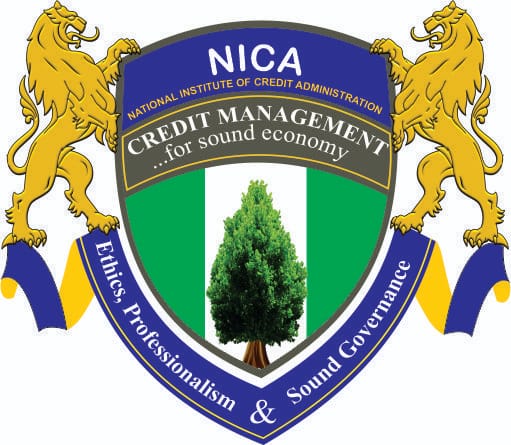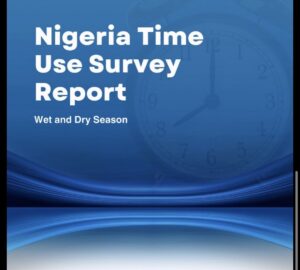NICA: Communique issued at the end of inaugural National Credit Managers Conference and annual Investiture of Nigeria Credit Industry Awards

National Institute of Credit Administration NICA
Introduction
The National Credit Managers Conference brought together policymakers, stakeholders, credit management professionals, legal experts, credit grantors/providers, and financial leaders to discuss critical strategies for advancing Nigeria’s economic growth through credit. Themed “Credit Grows Green Economy,” the conference emphasised the need for a strong credit infrastructure, responsible credit management practices, and financial literacy – recognising these as essential pillars for economic recovery, MSME empowerment, and sustainable development across key sectors.
The communique was signed by the Registrar/Chief Executive Officer, National Institute of Credit Administration (NICA), chartered. Prof. Chris Onalo.
Conference Highlights
The sessions featured in-depth discussions, policy pronouncements, and strategic recommendations across 12 presentations. Key highlights include:
1. Vice President’s Speech: Vice President Kashim Shettima officially proclaimed Credit Management as a profession in Nigeria—a landmark policy statement acknowledging the critical role of professional credit managers in maintaining economic stability. This recognition elevates the credit management field, establishing a professional framework to support industry standards and promote national credit economic integrity. Additionally, the Vice President reiterated the Federal Government’s commitment to building a credit-driven economy that aligns with Nigeria’s development goals.
2. Lagos State Governor’s Address: The Governor of Lagos State emphasised the state’s dedication to policies integrating credit management into local economic strategies, especially to support MSMEs and local industries, stressing that a structured credit ecosystem is essential for economic growth, resilience, and financial inclusion in Nigeria’s economic hub.
3. Keynote Address on the Conference Theme: Delivered by the Acting Executive Secretary of the National Universities Commission (NUC). The address underscored the importance of credit management education as a national priority. The NUC announced plans to collaborate with the National Institute of Credit Administration (NICA) to integrate Credit Management into the curriculum for tertiary institutions across Nigeria. This initiative aims to equip future generations with the knowledge and skills required to navigate and contribute to a credit-driven economy.
4. National Credit Guarantee Corporation (NCGC): The presentation on the NCGC highlighted several critical proposals from NICA to the Federal Government, to address credit access gaps for MSMEs. Key suggestions included the establishment of a well-funded/capitalized National Credit Guarantee Corporation, designed to provide credit guarantee services to reduce risks faced by credit providers/grantors and to enable MSMEs to secure financing for business expansion, growth and start-up. The scheme recommends an initial Federal Government allocation of between N1 trillion and N2 trillion to support the guarantee fund, along with a structured creditworthiness determination mechanism in order to streamline a risk-sharing spectrum. These initiatives are intended to foster a viable MSME sector that contributes to the country’s GDP and in turn, enhances Nigeria’s economic diversification for a strong industrial base.
5. The Role of Mortgage Credit in National Economic Recovery and Reconstruction: Mr. Shehu Usman Osidi, FICA, Managing Director of the Federal Mortgage Bank of Nigeria, discussed the transformative potential of mortgage credit in economic recovery. He emphasized how increased access to affordable mortgages can stimulate job creation, boost household net worth, and enhance economic stability. Mr. Osidi highlighted current government initiatives, like the National Social Housing Fund and proposed reforms to improve mortgage penetration. These programs aim to address Nigeria’s housing deficit and contribute to economic growth by increasing mortgage accessibility.
6. Consumer Credit Guarantee for Made-in-Nigeria Goods and Services: Otunba Aderemi Abdul emphasised the importance of consumer credit in supporting Nigeria’s local manufacturing sector through the “Buy Made-in-Nigeria” initiative. By enhancing access to consumer credit, Nigeria can increase demand for locally produced goods, reduce reliance on imports, and foster economic independence, thereby reinforcing the role of credit in national economic development.
7. The Role of Consumer Credit in National Economic Recovery and Reconstruction: Mr. Taiwo Ayedun discussed the pivotal role of consumer credit in driving household consumption, increasing financial inclusion, and stimulating the economy. Highlighting consumer credit’s potential to significantly expand Nigeria’s GDP, Mr. Ayedun recommended targeted policies to make credit more available, accessible, affordable, and responsibly utilised to foster a resilient credit economy.
8. Examining Issues that Undermine Debt Recovery through Litigation in Nigeria: Mazi Afam Osigwe, SAN, outlined key challenges in debt recovery through litigation, including delays, high legal costs, and jurisdictional issues. The paper recommended adopting alternative dispute resolution (ADR) methods, streamlined legal frameworks, and commercial courts to specialize in debt recovery cases to enhance recovery rates and strengthen creditor confidence.
9. How Credit Propels Economic Growth: The presentation, by Mr. Olufemi Murainio, FICA, emphasised credit’s critical role in stimulating sectors essential to Nigeria’s economic progress. By enhancing credit infrastructure and creating policies to support diverse industries, the credit economy will ultimately serve as a lever for national development, wealth creation, employment generation, and provider of healthy living standards for the citizens.
10. Credit in Agriculture: Mr. Celestine Uche Ohale, FICA, highlighted the current state and challenges of agricultural credit, urging revitalization of the Bank of Agriculture to provide sustained support for farmers. Agricultural credit was identified as fundamental to stabilizing food security, supporting rural economic growth, and reducing poverty in Nigeria.
11. Bank Credit Administration: The Good, Bad, and Ugly: Mr. Akinwunmi Lawal, FICA, discussed the complexities of bank credit administration, focusing on the necessity of a robust risk management practices and efficient loan recovery strategies to ensure the stability of Nigeria’s banking sector.
12. The Impact of Using Credit to Scale Production: Mr. Joseph Olusola Ayuba, FICA, presented on the role of credit in expanding manufacturing, underscoring the need for accessible credit facilities, credit literacy programs, and improved infrastructure to support Nigeria’s production sector. Through well-managed access to credit and an attractive structured institutional framework which promotes credit availability for manufacturers, Nigeria would be on her way to achieving a strong and resilient industrialisation.
Key Resolutions and Takeaways
The conference produced several resolutions to support Nigeria’s economic development through enhanced credit structures:
1. Establishment of the National Credit Guarantee Corporation (NCGC): The conference supported the establishment of a well-funded/capitalized NCGC by the Federal Government of Nigeria to back MSMEs with credit guarantees, enabling access to financing and minimising risks faced by credit grantors/providers.
2. Integration of Credit Management into National Curriculum: In collaboration with the National Institute of Credit Administration (NICA), chartered, the NUC will integrate credit management courses into Nigeria’s tertiary education curriculum, preparing the future and next generation of credit professionals to navigate and support a credit-driven economy. Given that credit economy and management fundamentally emphasize personal and corporate integrity, honesty, trust, and truthfulness, there is no question that credit administration is a legitimate and essential field of study, deserving of a well-developed curriculum.
3. Expansion of Mortgage Credit Accessibility: The conference called for increased investment in mortgage financing to support housing development, job creation, and economic stability. Emphasis was placed on government-led initiatives like the National Social Housing Fund and reforms in mortgage accessibility.
4. Promotion of Consumer Credit for Local Manufacturing: Aligned with the “Buy Made-in-Nigeria” initiative, expanding consumer credit will drive demand for local products, supporting economic self-sufficiency and reducing import reliance.
5. Debt Recovery Reform: The conference advocated for streamlined debt recovery processes, including ADR methods, commercial courts dedicated to debt recovery cases, and legal reforms to increase recovery efficiency and boost creditors’ confidence.
6. Adoption of Technology in Credit Management: AI, digital credit scoring, and blockchain technology were recommended to improve credit risk assessments, enhance transparency, and facilitate efficient credit recovery processing.
7. Credit Literacy and Responsible Credit Access: Recognising the importance of credit literacy, the conference called for nationwide educational initiatives to promote responsible credit use, repayment discipline, and sustainable credit growth.
Next Steps
1. Collaborative Partnerships: Enhance partnerships between the government, National Institute of Credit Administration (NICA), chartered, and other relevant bodies to ensure credit policies align with national economic and social development goals.
2. Incentives for Technology Adoption: Encourage financial institutions to invest in technology solutions that make credit processes more efficient and accessible, especially for underserved sectors.
3. Policy Development for Sustainable Credit Growth: Develop policies supporting responsible credit schemes and economic stability, mitigating the risks associated with rapid credit expansion along with the establishment of a National Credit Guarantee Corporation, funded by the Federal Government with substantial funding/capital, as a decisive step to address the persistent issue of limited access to finance by the nation’s MSMEs.
Conclusion
The National Credit Managers Conference underscored the transformative power of a robust credit system in Nigeria’s economic growth. With a collective commitment to advancing policies, education, and partnerships, participants and attendees affirmed their dedication to fostering a credit framework that supports local industries, enhances financial inclusion, and bolsters long-term economic resilience. We thank all speakers, participants, and the organising committee for their contributions toward a stronger Nigerian credit ecosystem.




